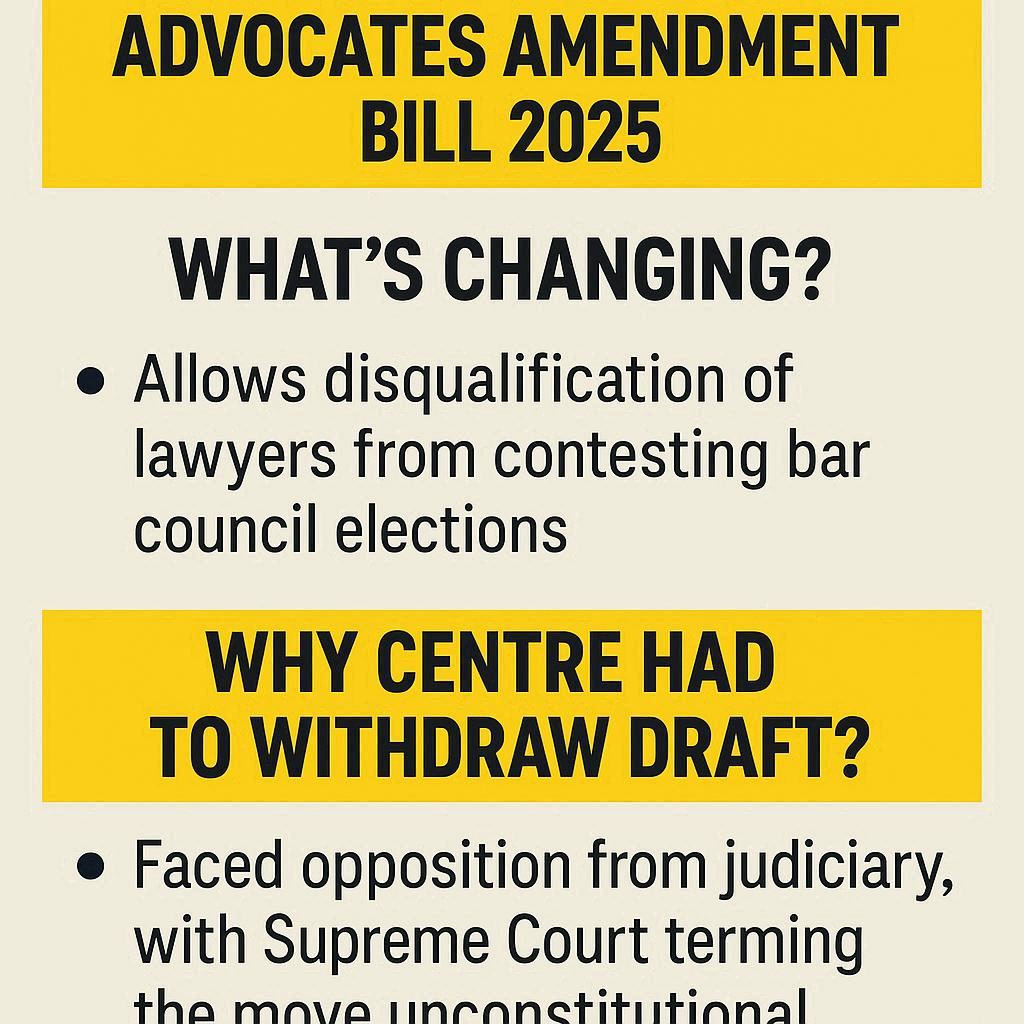As of my last update, there is no “Advocates (Amendment) Bill 2025.” The recent and highly contentious amendment you are referring to is the Advocates (Amendment) Bill, 2023, which was passed by Parliament in August 2023.

The confusion likely arises because the government was forced to withdraw a key provision of this already passed law in 2024 due to massive protests from the legal community.
Here is a breakdown of what happened, which perfectly addresses the core of your question: what was changing, and why the Centre had to effectively U-turn.
Table of Contents
ToggleThe Proposed Change: The 2023 Amendment
The Advocates (Amendment) Bill, 2023, was introduced with the stated aim of cleaning up the legal profession by tackling the problem of “touts” (unauthorized individuals who solicit legal work).
However, it contained a controversial provision:
- The Change: The bill sought to re-introduce a version of Section 30 of the Legal Practitioners Act, 1879, which had been repealed.
- What it Would Do: This change would have empowered any court or magistrate to sentence an advocate to up to six months in prison for “misconduct” committed inside the courtroom, with the sentence to be executed immediately.
Why This Was a Major Issue for Lawyers
The legal fraternity, led by the Bar Council of India (BCI), erupted in protest. Their reasons were fundamental:
- Bypassing the Disciplinary Body: The primary objection was that this power bypassed the Bar Council. Under the Advocates Act, 1961, disciplinary action for professional misconduct is the sole domain of the Bar Council (a body of elected lawyers). This is a peer-review process.
- Violation of Natural Justice: The provision would make the magistrate the complainant, judge, and executioner. An advocate could be jailed summarily without a proper hearing or right to appeal, violating the principle of audi alteram partem (hear the other side).
- Vague and Subjective: The term “misconduct” was not clearly defined, making it susceptible to misuse against lawyers who argue fearlessly against the state or take an aggressive stance for their clients.
- Threat to Independence of Bar: Lawyers argued this would create a chilling effect, undermining their independence and ability to represent clients without fear of immediate imprisonment by the presiding judge.
Why the Centre Had to Withdraw the Draft Provision
The pressure on the government became untenable, leading to a major climbdown. Here’s why the Centre had to act:
- Nationwide Protests and Boycotts: Following the passage of the bill, lawyers across India, particularly in states like Uttar Pradesh, Delhi, and Punjab, began indefinite boycotts of court work. This brought the judicial machinery to a standstill, creating immense pressure on the government and judiciary to resolve the impasse.
- Pressure from the Supreme Court: The Bar Council of India (BCI) filed a petition in the Supreme Court challenging the constitutional validity of the amendment. The Supreme Court took a serious view of the matter and was actively hearing the case.
- Assurance by the Attorney General: In a hearing before the Supreme Court in March 2024, the Attorney General of India, R. Venkataramani, assured the court that the Central Government would not enforce the controversial provision.
- Formal Withdrawal of the Rule: The final step came in July 2024, when the Ministry of Law and Justice officially withdraww the rules it had drafted to operationalize Section 30. This was a formal admission that the provision was unworkable due to the unified opposition of the bar.
Summary: What is the Status Now?
- The Advocates (Amendment) Act, 2023 is technically still on the statute books.
- However, its most controversial part—the provision giving magistrates the power to jail lawyers for courtroom misconduct—has been effectively neutered.
- The government first gave an assurance to the Supreme Court not to implement it, and then formally withdrew the rules needed to bring it into effect.
- The underlying conflict—between the bar’s desire for self-regulation and the legislature’s intent to ensure courtroom discipline—remains, but for now, the pre-2023 disciplinary mechanism via the Bar Councils continues unchanged.
In conclusion, the “withdrawal” wasn’t of a 2025 draft bill, but of the operational rules of the 2023 Act, forced by unprecedented protests from the legal community and intervention by the Supreme Court.
